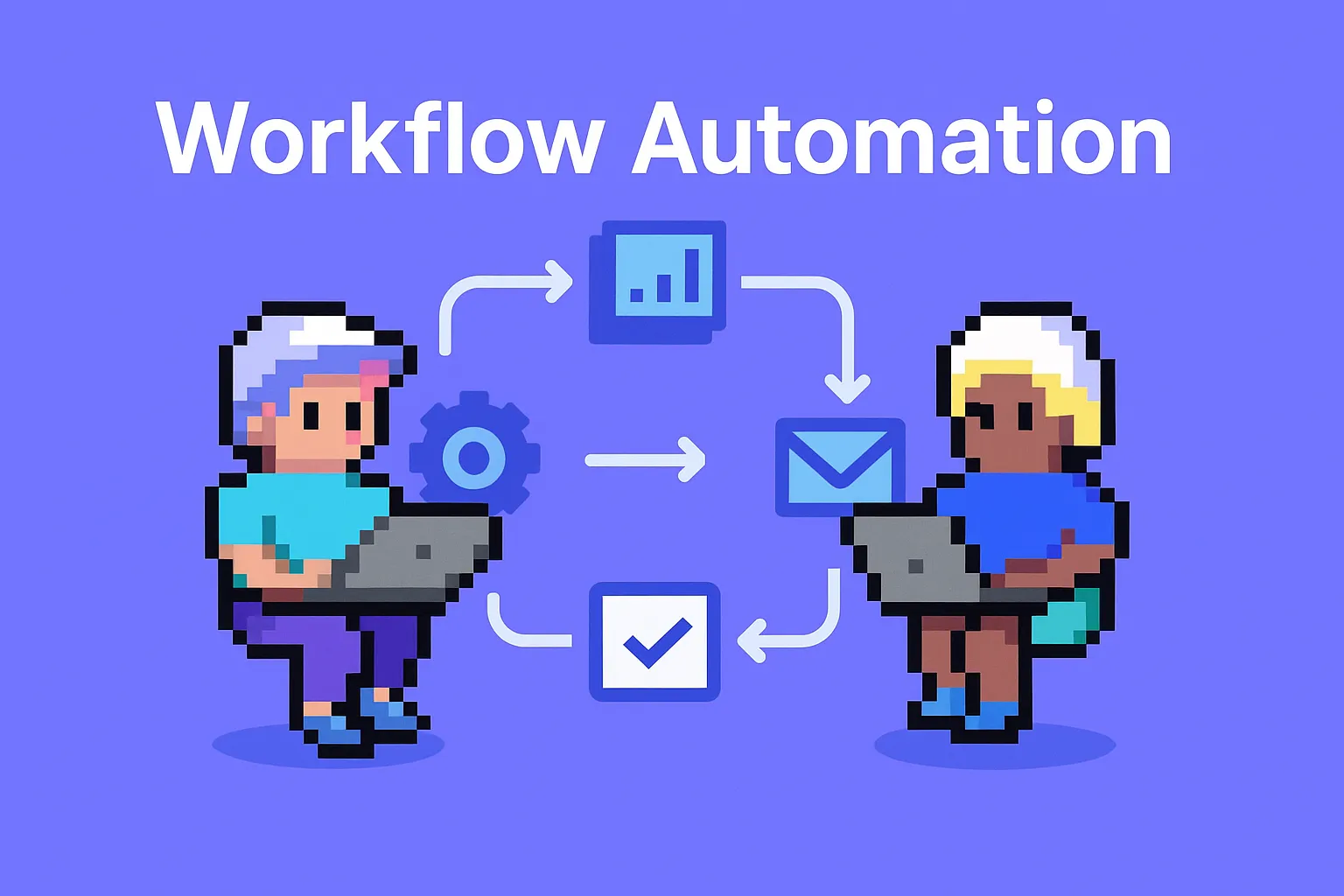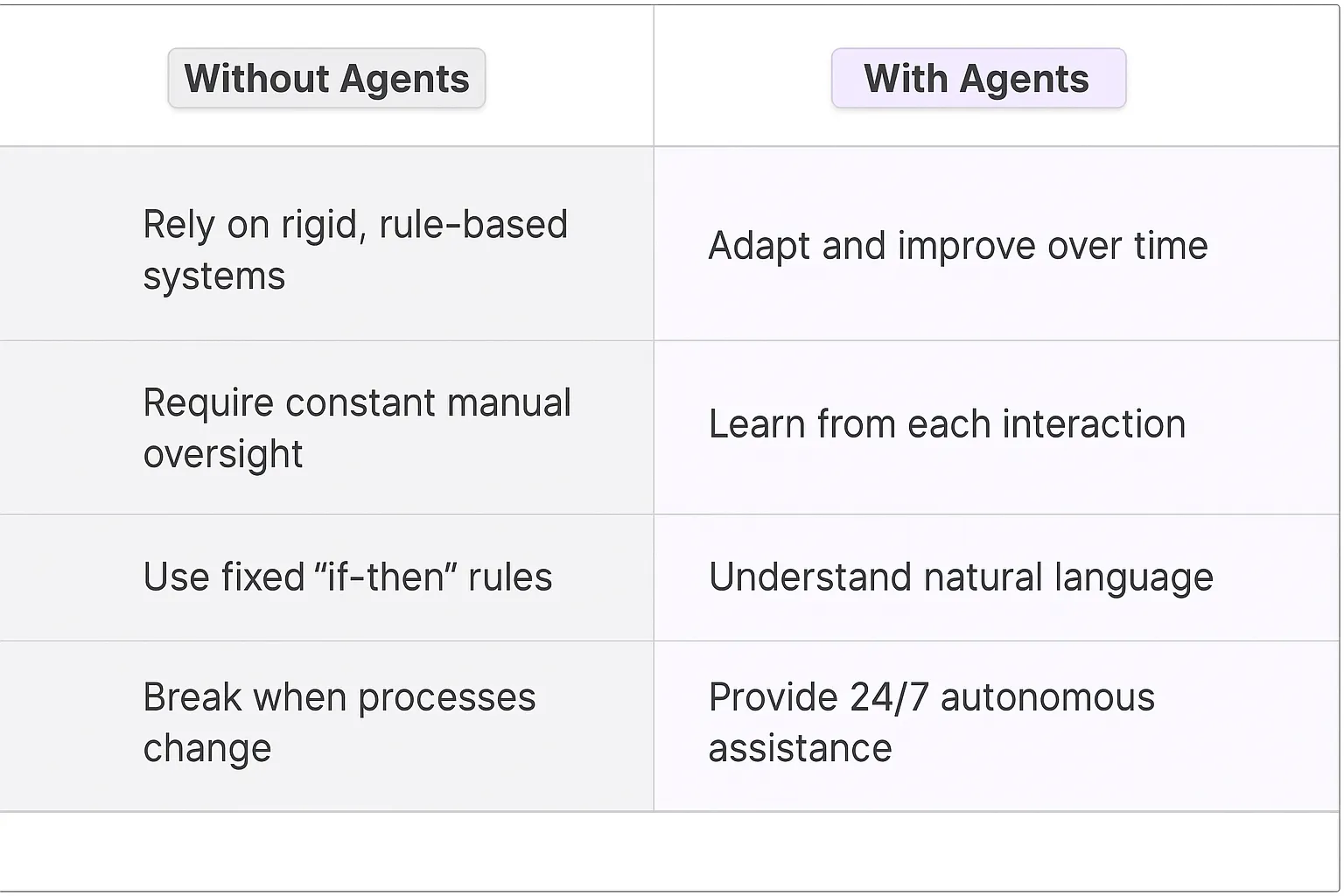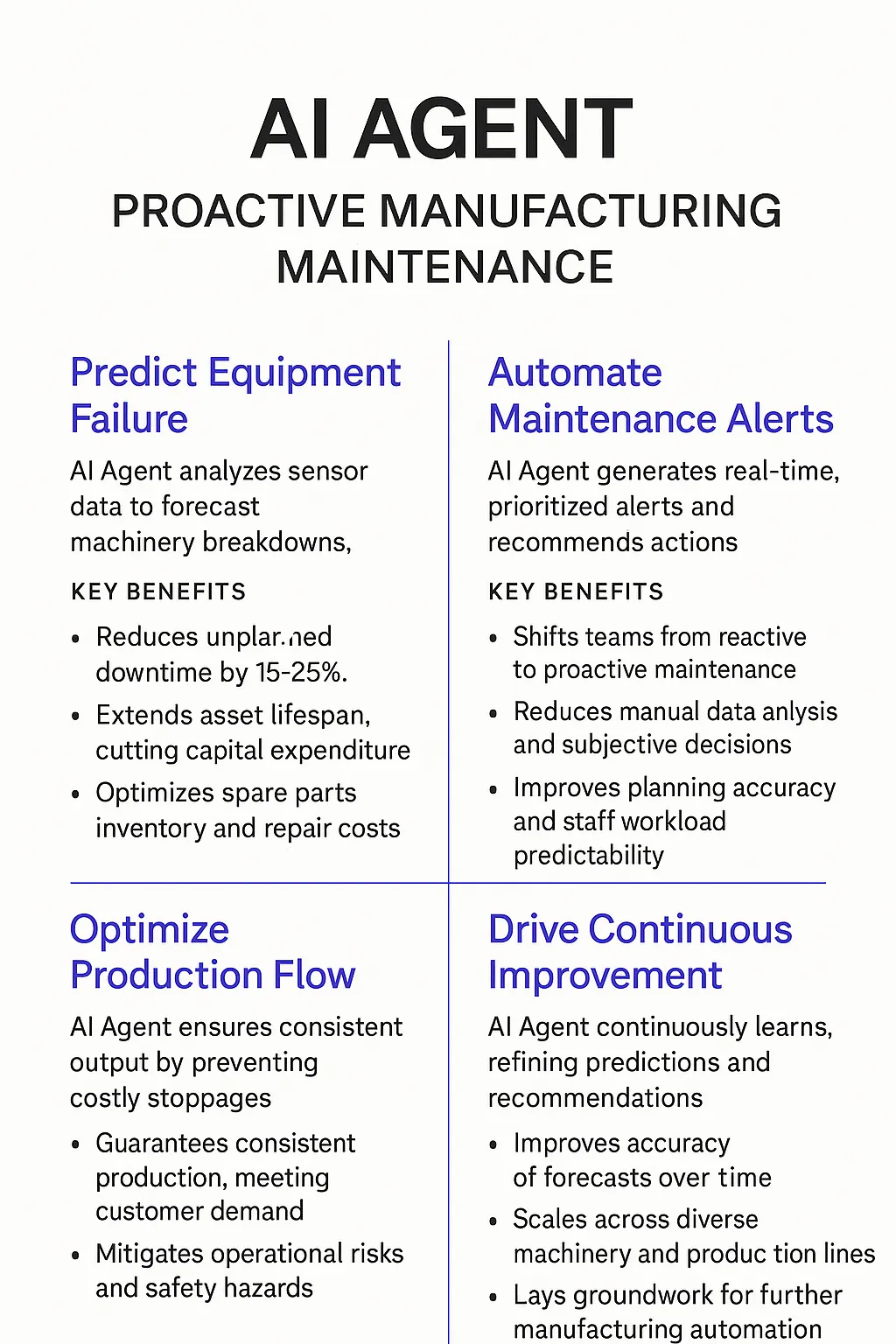Workflow Automation AI Agents
The Evolution of Workflow Automation with AI Agents
What is Workflow Automation?
Workflow automation is the process of using technology to streamline and optimize business processes. It's about taking repetitive, time-consuming tasks and letting software handle them automatically. But with AI agents, we're not just talking about simple, rule-based automation. We're entering a new era where machines can learn, adapt, and make decisions, fundamentally changing how work gets done.
Key Features of Workflow Automation
The key features of modern workflow automation powered by AI agents include:
- Adaptive Learning: These systems evolve and improve over time, learning from each interaction and outcome.
- Natural Language Processing: AI agents can understand and respond to human language, making them more intuitive to use.
- Predictive Analytics: They can anticipate issues and suggest solutions before problems arise.
- Cross-system Integration: AI agents can work across different platforms and systems, creating a seamless workflow.
- Real-time Decision Making: They can process vast amounts of data and make decisions in milliseconds.
- Scalability: These systems can handle increasing complexity as your business grows.
This isn't just about doing things faster; it's about doing them smarter. AI agents in workflow automation are like having a team of tireless, brilliant assistants who are constantly learning and improving. They're changing the game, and businesses that don't adapt risk being left behind. The focus on process optimization has never been more critical.

Benefits of AI Agents for Workflow Automation
What would have been used before AI Agents?
Before AI agents entered the scene, workflow automation was like trying to navigate a complex city with just a paper map. Companies relied on rigid, rule-based systems that required constant human oversight. These traditional tools were the equivalent of those clunky GPS devices from the early 2000s – functional, but far from optimal.
Teams would spend countless hours manually configuring workflows, writing intricate if-then statements, and troubleshooting when processes inevitably broke down. It was a world of bottlenecks, human error, and missed opportunities for optimization. The promise of automation was there, but the execution left much to be desired.
What are the benefits of AI Agents?
Enter AI agents – the self-driving cars of workflow automation. These digital teammates bring a level of intelligence and adaptability that's transforming how businesses operate. Here's why they're a game-changer:
- Adaptive Learning: AI agents don't just follow rules; they learn and evolve. They analyze patterns in your workflows, identifying inefficiencies and suggesting improvements. It's like having a brilliant intern who never sleeps and gets smarter every day.
- Predictive Capabilities: These agents can anticipate bottlenecks before they happen. They're the business equivalent of a weather forecast, helping you prepare for storms in your workflow before they hit.
- Natural Language Processing: Forget about learning complex programming languages. AI agents understand and execute tasks based on natural language inputs. It's like texting your most competent colleague to get things done.
- Scalability: As your business grows, AI agents grow with you. They can handle increasing complexity without breaking a sweat, ensuring your automation scales as smoothly as a well-funded startup.
- Error Reduction: By minimizing human intervention in repetitive tasks, AI agents significantly reduce errors. They're like having a proofreader with superhuman attention to detail.
- 24/7 Availability: Unlike human employees, AI agents don't need sleep or coffee breaks. They're always on, ensuring your workflows keep moving, even when your team is offline.
- Data-Driven Insights: These agents don't just execute tasks; they provide valuable insights. It's like having a data scientist embedded in your workflow, constantly mining for actionable intelligence.
The shift to AI agents in workflow automation isn't just an upgrade; it's a paradigm shift. It's the difference between using a flip phone and a smartphone. Sure, they both make calls, but one opens up a world of possibilities the other can't touch. As businesses navigate the complexities of the digital age, AI agents are becoming not just a nice-to-have, but a crucial component of staying competitive and agile. The focus on process improvements has never been more important.

Potential Use Cases of AI Agents with Workflow Automation
Processes
Let's dive into the world of workflow automation AI agents - these digital teammates are game-changers for businesses looking to level up their operations. They're not just tools; they're the secret sauce that can transform how companies handle complex processes.
One killer use case is in supply chain management. Picture an AI agent that doesn't just track inventory, but predicts demand fluctuations, suggests optimal reorder points, and even negotiates with suppliers for the best deals. It's like having a supply chain guru working 24/7, but without the need for coffee breaks.
Another area where these agents shine is in customer service workflows. They can triage incoming requests, route them to the right department, and even resolve simple issues on their own. The result? Happier customers and less stressed-out support teams. It's a win-win that can dramatically improve a company's Net Promoter Score.
Tasks
When it comes to individual tasks, workflow automation AI agents are the unsung heroes of productivity. They're like having a personal assistant who never sleeps and has a photographic memory for every detail of your business processes.
Take data entry, for example. An AI agent can extract information from emails, invoices, and other documents, populate databases, and even flag inconsistencies or errors. This isn't just about saving time; it's about eliminating the mind-numbing work that leads to burnout and errors.
Another game-changing use case is in project management. These digital teammates can automatically update project timelines, allocate resources based on real-time availability, and even predict potential bottlenecks before they happen. It's like having a crystal ball for your project's future, helping you avoid those "how did we miss this?" moments.
The beauty of these AI agents is that they're not just executing tasks; they're learning and improving over time. They're analyzing patterns, identifying inefficiencies, and suggesting process improvements. In essence, they're not just following your playbook - they're helping you write a better one.
As we look to the future, the potential of workflow automation AI agents is massive. They're not replacing human creativity and decision-making; they're augmenting it, allowing us to focus on the high-level strategy and innovation that drives businesses forward. The companies that embrace these digital teammates early and effectively will have a significant competitive advantage in the years to come.

Industry Use Cases: AI Agents Transforming Workflow Automation
The versatility of AI agents in workflow automation makes them valuable across various industries. Let's dive into some meaty, industry-specific use cases that showcase how AI can reshape workflows and processes. These aren't your run-of-the-mill examples; we're talking about AI agents that are fundamentally altering how work gets done.
What's fascinating is how these digital teammates are adapting to different sectors, each with its unique challenges and opportunities. They're not just automating tasks; they're augmenting human capabilities in ways we couldn't have imagined a few years ago. From healthcare to finance, manufacturing to creative industries, AI agents are becoming indispensable partners in the workflow.
But here's the kicker: the real power lies in how these AI agents learn and evolve. They're not static tools; they're dynamic entities that grow smarter with each interaction, continuously refining their ability to handle complex workflows. This adaptability is what sets them apart and makes them game-changers across industries.
So, let's roll up our sleeves and explore how these AI agents are transforming workflows in various sectors. We'll see concrete examples of how they're not just improving efficiency, but also enabling new possibilities and driving innovation. The implementation of workflow automation is creating unprecedented levels of operational efficiency. Buckle up; it's going to be an eye-opening ride through the landscape of AI-powered workflow automation.
Manufacturing: The Next Frontier for Workflow Automation AI Agents
Let's talk about manufacturing. It's an industry ripe for disruption, and workflow automation AI agents are the perfect tool to shake things up. Think about the complexity of a modern factory floor - it's a symphony of moving parts, both literal and figurative.
These AI agents can be the conductors of this industrial orchestra. They're not just about replacing human tasks; they're about augmenting and elevating human capabilities. Here's where it gets interesting:
Predictive maintenance is a game-changer. AI agents can analyze data from sensors on machinery in real-time, predicting when a piece of equipment is likely to fail before it actually does. This isn't just about avoiding downtime - it's about fundamentally changing how we approach equipment lifecycle management.
But let's go deeper. These AI agents can optimize entire production lines on the fly. They can adjust parameters based on incoming orders, material availability, and even external factors like weather or market conditions. It's like having a hyper-intelligent production manager that never sleeps and can make decisions in milliseconds.
The real magic happens when these AI agents start collaborating. Imagine an agent managing inventory talking to another handling logistics, coordinating with a third overseeing quality control. They're not just executing tasks; they're problem-solving in real-time, finding efficiencies that humans might never spot.
This isn't science fiction. Companies implementing these systems are seeing double-digit improvements in productivity and significant reductions in waste. It's a shift from reactive to proactive manufacturing, and it's happening now.
The implications are profound. We're looking at factories that can pivot production almost instantly, responding to market demands with unprecedented agility. It's manufacturing-as-a-service, powered by AI.
But here's the kicker - this technology is becoming more accessible. It's not just for the giants anymore. Smaller manufacturers can now leverage these tools, leveling the playing field and sparking a new wave of innovation in the sector.
Workflow automation AI agents in manufacturing aren't just an improvement - they're a reinvention of how we think about production. And trust me, this is just the beginning. The factories of tomorrow will be as much about bits and algorithms as they are about nuts and bolts. Welcome to the future of making things.
Finance: AI Agents Reshaping the Future of Trading
The finance industry is on the cusp of a major transformation, and workflow automation AI agents are the catalysts. We're not talking about simple chatbots or rule-based algorithms here. These are sophisticated digital teammates that are redefining how trading operates at its core.
Let's dive into the world of high-frequency trading (HFT). Traditionally, HFT relied on speed and brute force. But now, AI agents are bringing a new level of intelligence to the game. They're not just executing trades faster; they're making smarter decisions in microseconds.
These AI agents are consuming vast amounts of data - market trends, news feeds, social media sentiment, even satellite imagery of crop yields or oil tanker movements. They're piecing together complex puzzles that human traders simply can't process in real-time.
But here's where it gets really interesting: these AI agents are learning and adapting on the fly. They're not static algorithms. They're evolving strategies based on market conditions, adjusting risk profiles, and even collaborating with other AI agents to execute complex, multi-step trading strategies.
The implications are profound. We're moving towards a market where AI agents are not just participants but market makers. They're creating liquidity, discovering prices, and even potentially stabilizing markets during volatile periods.
And it's not just about making money. These AI agents are becoming crucial for risk management. They're spotting potential market anomalies or systemic risks before they become full-blown crises. It's like having a financial early warning system that operates at the speed of light.
But let's talk about the human element. Contrary to popular belief, these AI agents aren't replacing traders. They're augmenting them. The most successful firms are those where human traders and AI agents work in symbiosis. Humans provide the strategic oversight and creative thinking, while AI agents handle the execution and real-time analysis.
This shift is democratizing finance in unexpected ways. Smaller firms and even individual traders can now leverage AI capabilities that were once the domain of only the biggest players. It's leveling the playing field and potentially making markets more efficient and fair.
The regulatory implications are massive. How do you regulate a market where decisions are made in milliseconds by AI? It's a challenge that regulators and the industry are grappling with, and it's going to shape the future of financial regulation.
We're at the beginning of this revolution. The finance industry of the future will be powered by these AI agents, creating a market that's faster, smarter, and potentially more stable. It's not just an evolution; it's a complete reimagining of how financial markets operate. And for those who can harness this technology effectively, the opportunities are limitless.
Considerations
Technical Challenges
Implementing workflow automation AI agents isn't a walk in the park. It's more like navigating a tech minefield while juggling flaming torches. First up, you're dealing with the integration nightmare. These digital teammates need to play nice with your existing tech stack, and trust me, that's easier said than done. You might find yourself knee-deep in API documentation, trying to make your shiny new AI agent talk to that legacy system from the stone age.
Then there's the data conundrum. Your AI agent is only as good as the data it's fed. If your data is a mess (and let's be real, whose isn't?), you're setting yourself up for a world of hurt. Garbage in, garbage out, as they say. You'll need to invest serious time and resources into data cleaning and structuring before your AI can even think about automating workflows effectively.
And let's not forget about scalability. Sure, your AI agent might work like a charm when you're running a few processes. But what happens when you crank up the volume? Can it handle the load without breaking a sweat? Scaling AI systems is a whole different ball game, and it's one you need to be prepared for from the get-go.
Operational Challenges
On the operational front, you're looking at a different set of headaches. First off, there's the human factor. Your team might be resistant to change, especially when that change comes in the form of a digital teammate that's threatening to automate their jobs. You'll need to navigate this minefield carefully, emphasizing how AI can augment human work rather than replace it.
Then there's the learning curve. These AI agents aren't plug-and-play solutions. They require training, fine-tuning, and constant monitoring. You'll need to allocate resources for this ongoing process, and it's not cheap. Plus, you'll need to upskill your team to work effectively alongside these digital teammates. It's not just about implementing the tech; it's about creating a whole new workflow ecosystem.
Governance is another beast you'll need to tame. Who's responsible when the AI makes a mistake? How do you ensure transparency and accountability in AI-driven processes? These are questions you'll need to grapple with, and they don't have easy answers.
Lastly, there's the ROI question. Implementing AI agents for workflow automation is a significant investment, both in terms of time and money. You'll need to have clear metrics in place to measure success and justify the expense. And let me tell you, quantifying the impact of AI isn't always straightforward. You might find yourself in the tricky position of trying to put a dollar value on intangibles like improved decision-making or freed-up human creativity.
In the end, implementing workflow automation AI agents is a complex dance of technology, strategy, and change management. It's not for the faint of heart, but for those who can navigate these challenges, the potential rewards are enormous. Just remember, there's no such thing as a silver bullet in tech. AI agents are powerful tools, but they're not magic wands. Approach with caution, plan meticulously, and be prepared for a wild ride.
Embracing the AI-Driven Workflow Revolution
Workflow automation AI agents are more than just a technological advancement; they're a paradigm shift in how we approach work. They're breaking down silos, bridging gaps between systems, and enabling levels of efficiency and innovation that were previously unimaginable.
But let's be real - this isn't a plug-and-play solution. Implementing these AI agents comes with significant technical and operational challenges. It requires a strategic approach, a willingness to rethink processes from the ground up, and a commitment to ongoing learning and adaptation.
The potential payoff, however, is enormous. From predictive maintenance in manufacturing to real-time decision-making in finance, these AI agents are opening up new frontiers of possibility. They're not just automating tasks; they're augmenting human capabilities, freeing up our time and brainpower for higher-level strategic thinking and creativity.
As we look to the future, it's clear that workflow automation AI agents will play an increasingly central role in how businesses operate. The companies that can effectively harness this technology - navigating the challenges and capitalizing on the opportunities - will be the ones that thrive in the digital age.
The revolution is here. The question is: are you ready to embrace it?













